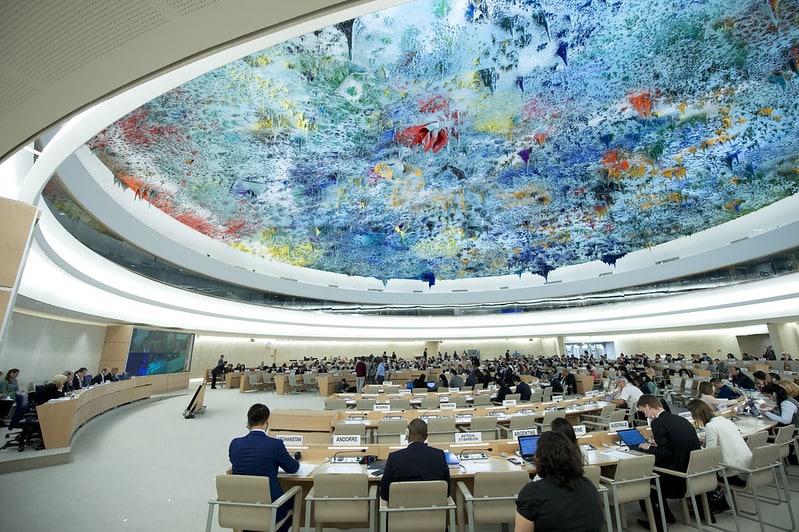It’s well documented that banning drugs leads to violence. But a new paper, published in the International Journal of Drug Policy, argues that the predictable proliferation of this violence—and its effect on people around the globe—could be considered a violation of the fundamental right to life and safety, as defined by the United Nations.
The United States’ alcohol Prohibition in the 1920s is often cited as an example of what happens when you remove regulation from a lucrative market. Groups operating outside the law are heavily incentivized to participate in the trade and to protect their market shares—by whatever means they can, in the absence of a rules-based system.
A century later, prohibition of many drugs by most countries continues to produce equivalent incentives. The resulting violence may involve rival groups competing with each other, or groups protecting their trade from law enforcement. Police, of course, directly enact violence in fighting the global drug war. In some countries, atrocities are perpetrated by a combination of official law enforcement and associated vigilantes. And drug enforcement has also been shown to contribute indirectly to violence: Arresting leaders of trafficking organizations creates volatility as others bid to fill the vacuum.
“In order to be legitimate, a policy that entails a large number of homicides must protect against more harm than what it causes.”
Petter Johnstad, the author of the new paper, is a high school teacher in Bergen, Norway, with doctorates in psychology and religious studies. His article cites various research on the topics of drug criminalization and violent crime, the harms associated with some drugs, human rights policies, and more. His analysis, matching others’ past findings, suggests that besides producing violence, drug criminalization does not appear to reduce the consumption of illicit drugs, and is a net creator of harms.
“It is obvious today that drug criminalization leads to violent crime. In order to be legitimate, a policy that entails a large number of homicides must protect against more harm than what it causes,” Johnstad wrote in an email to Filter, adding that this does not appear to be the case.
One of the main cruxes of his paper is that prohibition as a policy—when we know it inevitably causes violence, including against many people involved in neither law enforcement nor the drug trade—leads to a violation of basic human rights.
The rights in question are enshrined in Article 3 of the Universal Declaration of Human Rights (UHDR), which states: “Everyone has the right to life, liberty and security of person.” (The European Convention on Human Rights has one of many examples of similar stipulations.)
Johnstad notes that every country has signed onto the UDHR. Many countries regularly violate parts of it, of course; he cites Russia, though even a country like Canada has plenty of failures.
As such, the paper continues, governments and even voters who support prohibition can be considered as having endorsed breaking a human right to life and safety. And that could apply similarly to the United Nations Office on Drugs and Crime (UNODC), Johnstad said. The UNODC, which has a history of supporting global prohibition, did not respond to Filter’s request for comment by publication time.
“The drug criminalization regime is moving along a path of gradual dissolution and will be abolished sooner than most people think.”
Johnstad believes that international governments and the UN should abolish prohibition in order to end the violence and human rights violations—which disproportionately impact countries in the “Global South.” A human rights court, such as the European Court on Human Rights, could in theory, he said, consider a case that uses this kind of logic, “but I would not hold my breath for it.”
However, he added that he believes “the drug criminalization regime is moving along a path of gradual dissolution and will be abolished sooner than most people think. That remains to be seen, obviously.”
Emma Roberts, senior director of national capacity development at the National Harm Reduction Coalition in the US, agrees that the prohibition of drugs causes more harm than drugs themselves. “If we had a regulated drug market, then we would be able to save a lot more lives than we’re able to save right now,” she told Filter.
She added that there are several reasons politicians and voters may continue to support criminalization, however.
For one thing, the drug war benefits some people economically or politically. In the US, for example, unpaid or poorly paid prisoners make up to around $2 billion worth of goods each year and perform $9 billion worth of services in the upkeep of the prisons. Around 400,000 people are currently held on drug charges in the US alone. There’s private prisons, policing jobs, and profits for the companies that supply police and prisons. And profits for some Pharma companies are protected by the prohibition of rival versions of their drugs, among many other examples.
Politicians can also benefit from taking a hard anti-drug stance in places all over the world where such policies remain popular. “It’s about winning votes,” Roberts said. At the same time, many individuals may support criminalization simply because it’s all they’ve ever known or have been taught.
It’s in part a question, then, of finding ways to communicate the wealth of evidence for the harms of prohibition—like that compiled by Johnstad—to enough voters to make a difference.
Photograph of UN Human Rights Council session in 2016 by UN Geneva via Flickr/Creative Commons 2.0





Show Comments